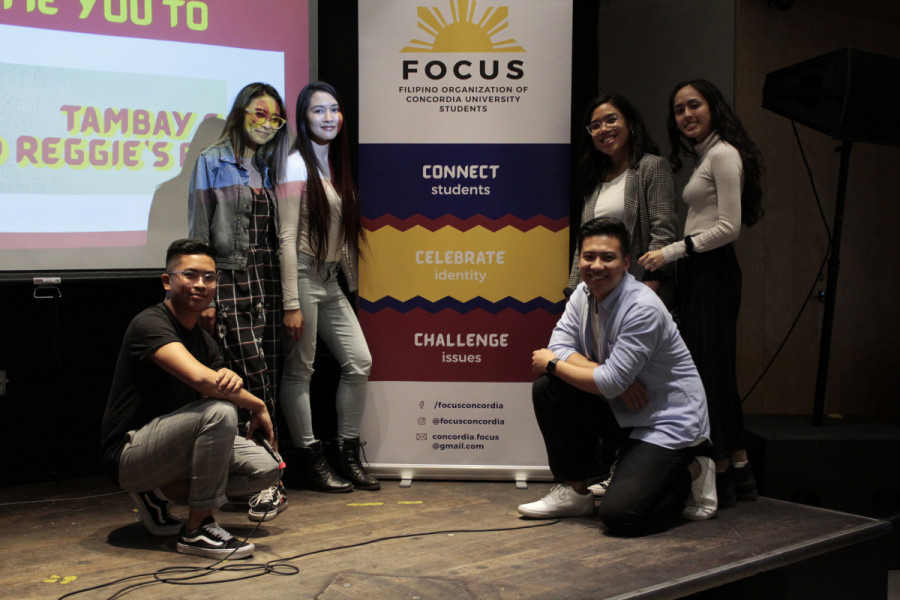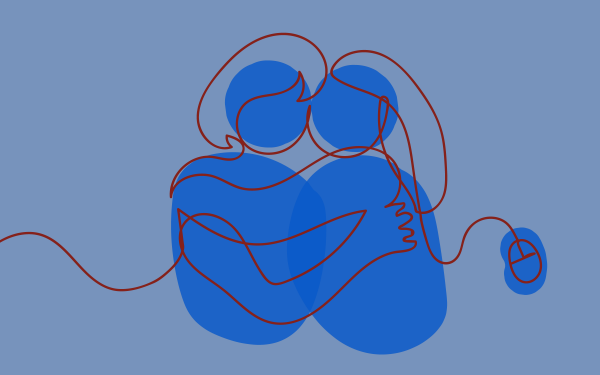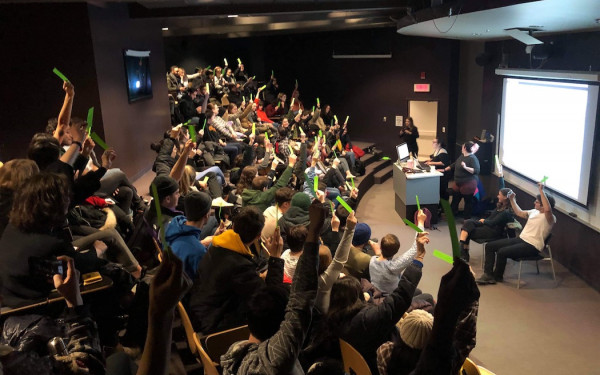Revived Concordia Student Association puts the FOCUS on Filipino Youth
The New Club Hopes to Break the Mould of What Filipinos Can Be
After a hiatus of over 10 years, the Filipino Organization of Concordia Students has returned.
FOCUS used to be a club underneath the Concordia Canadian Asian Society, but disbanded a few years after they were originally founded. The new executive team of FOCUS has revived the club and they hope to bring it back to its past glory.
FOCUS is now independent from CCAS, and are funded by the Concordia Student Union.
The club’s mandate is to connect students, celebrate Filipino identity, and challenge issues that touch Filipino youth.
Vice President of Marketing Joshua Bolofer, a communications student, wanted to create a community and network of Filipinos in an academic setting. He hopes to cause a ripple in their community and lift up young Filipinos.
He aims to give a place for Filipino youth to develop their leadership skills, so when they get into the workforce they can become powerhouses and leaders in the community.
“We can make things better for ourselves and others,” said Bolofer.
FOCUS wants to lead Filipino students to the resources that can help them with their problems. They want to create a conversation about the mental health issues brought on by a lack of emotional support from parents, body image issues from lolas (grandmothers) who insist their apos (grandchildren) should eat more or eat too much, toxic masculinity passed down from tatays (fathers) and titos (uncles), and the intergenerational gap separating parents from their kids.
Mental health is a taboo within the Filipino community. Everybody goes through something, but we’re taught to suppress it, not talk about it. If you bring it up, you’re probably crazy, or you’re over exaggerating.
—Shenna Ramos
President of FOCUS Shenna Ramos, a management major, wanted to revive the club to bridge the disconnect between herself and her heritage.
Growing up in the West Island, there were never many Filipinos at Ramos’ school, and if there were, they weren’t close.
“We were always scattered,” she said, “being Filipino was on the backburner.”
While Ramos had a superficial understanding of what it meant to be Filipino, it took some growing up to realize she was disconnected from her community. “I thought it was a big part of myself, until I realized I lacked knowledge and understanding of my heritage, my history, and my culture,” said Ramos.
Bolofer had a different childhood experience.
Growing up in Côte-des-Neiges, Bolofer was always in tune with his culture. He became involved with the Salinggawi Philippines Arts Organization at a young age, where he performed Filipino folk dances.
Bolofer noticed that the Filipino community was being run by self-involved titas (aunts), and there wasn’t a place for Filipino youth.
“I didn’t have any academic ates or kuyas,” he said, to show him how to create a positive change in their community.
‘Ate’ and ‘kuya’ are Filipino terms used to refer to someone who is older than you as a sign of respect. ‘Ate’ is used for a woman, and ‘kuya’ is used for a man.
“One of my aspirations is to make FOCUS a sustainable club. We’re going to have a structure that we can keep passing on,” said Bolofer.
“Mental health is a taboo within the Filipino community,” said Ramos. “Everybody goes through something, but we’re taught to suppress it, not talk about it. If you bring it up, you’re probably crazy, or you’re over exaggerating.”
She continued, “We aren’t given the tools to deal with it. So we really think there’s something wrong with us. We have no avenue to talk about our weaknesses.”
More often than not, Filipino parents would advise their kids to “pray it away” when they have a problem, said Bolofer.
Ramos wants FOCUS to open doors but also create bridges.
“You’re either one of two things,” Ramos explained, “You’re either born and raised here, you’re entitled, you’re disconnected from your culture, you’re basically a white person.”
Growing up in a majority white area, that’s how Ramos was judged by other Filipinos.
“Or you immigrated here from the Philippines. You’re called a FOB (fresh off the boat), you have a thick accent that people find silly, and you don’t know how to articulate your thoughts. That’s how you’re judged. You’re corny. You’re silly,” she continued.
These two groups create one-dimensional characters, “we’re super complex and interesting people, but we follow these stereotypes, even within the Filipino community,” Ramos said.
By giving Filipinos at Concordia a place to congregate, Ramos is hoping “you can learn about yourself and others; the different layers of your identity.”
Alongside helping Filipino youth, FOCUS wants to teach people about Filipino languages, food, and traditions. The club is open to everybody, with or without Filipino genes.
“I want to bring in people who are genuinely interested in the Filipino culture,” Ramos explained, “We don’t want people to appropriate our culture, but we want to instill knowledge as to who we are.”
FOCUS hosted their first event on Sept. 27 at Reggie’s Bar. It was a mixer complete with food, drinks, ice breakers, and karaoke. The warm atmosphere made it feel just like a family party. Everyone showcased Filipino hospitality and treated each other like lifelong friends.
This November FOCUS is organizing a ‘BYOR’ – bring your own rice. “We provide the Filipino food and you bring the necessity: the rice,” said Bolofer.







